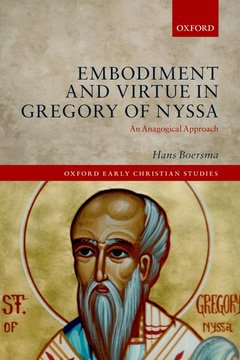Description
Embodiment and Virtue in Gregory of Nyssa
An Anagogical Approach
Oxford Early Christian Studies Series
Author: Boersma Hans
Language: English
Approximative price 52.86 €
In Print (Delivery period: 21 days).
Add to cart
Publication date: 03-2015
304 p. · 18x23.3 cm · Paperback
304 p. · 18x23.3 cm · Paperback
Description
/li>Biography
/li>
Embodiment in the theology of Gregory of Nyssa is a much-debated topic. Hans Boersma argues that this-worldly realities of time and space, which include embodiment, are not the focus of Gregory's theology. Instead, embodiment plays a distinctly subordinate role. The key to his theology, Boersma suggests, is anagogy, going upward in order to participate in the life of God. This book looks at a variety of topics connected to embodiment in Gregory's thought: time and space; allegory; gender, sexuality, and virginity; death and mourning; slavery, homelessness, and poverty; and the church as the body of Christ. In each instance, Boersma maintains, Gregory values embodiment only inasmuch as it enables us to go upward in the intellectual realm of the heavenly future. Boersma suggests that for Gregory embodiment and virtue serve the anagogical pursuit of otherworldly realities. Countering recent trends in scholarship that highlight Gregory's appreciation of the goodness of creation, this book argues that Gregory looks at embodiment as a means for human beings to grow in virtue and so to participate in the divine life. It is true that, as a Christian thinker, Gregory regards the creator-creature distinction as basic. But he also works with the distinction between spirit and matter. And Nyssen is convinced that in the hereafter the categories of time and space will disappear-while the human body will undergo an inconceivable transformation. This book, then, serves as a reminder of the profoundly otherworldly cast of Gregory's theology.
Hans Boersma holds the J.I. Packer Chair of Theology at Regent College in Vancouver, Canada. Before coming to Regent in 2005, he taught for six years at Trinity Western University in nearby Langley. Boersma holds a doctorate from the University of Utrecht. His articles have appeared in numerous journals. His publications include Violence, Hospitality, and the Cross: Reappropriating the Atonement Tradition (Baker Academic), which won the 2005 Christianity Today best theological book of the year award; Nouvelle Théologie and Sacramental Ontology: A Return to Mystery (OUP, 2009); and Heavenly Participation: The Weaving of a Sacramental Tapestry (Eerdmans, 2011).
© 2024 LAVOISIER S.A.S.




